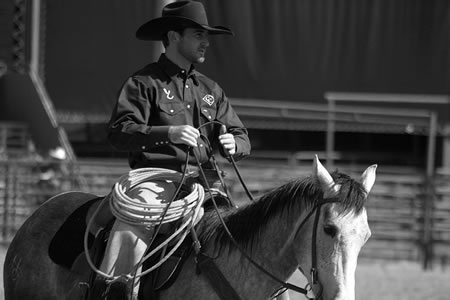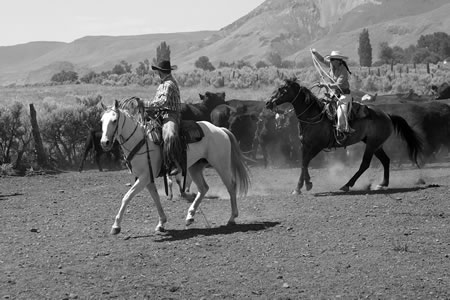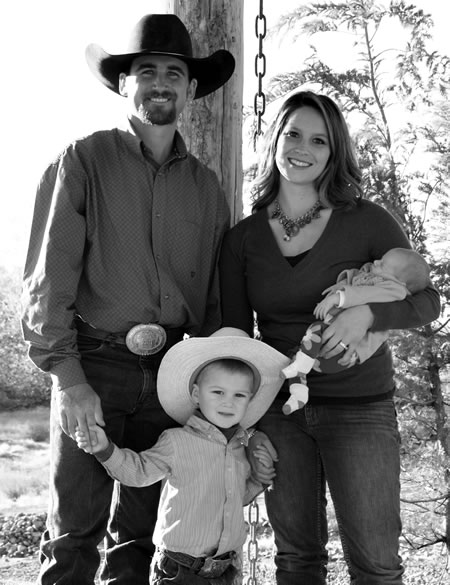Written by Tom Moates
This article originally appeared in Eclectic Horseman Issue No.69 – Subscribe Today!
Cowboy, colt starter, horse trainer, and rough stock rider Wade Black could steer his equine career in a wide range of directions.
In recent years, he has developed a business and website called, Training for the Cross (www.trainingforthecross.com), which offers many equine services. The website explains: “We focus on creating solid ranch & arena horse prospects, day work services of Low Stress Livestock Handling, and offer tips on improving your Horsemanship, Stockmanship, Ranch Roping, and Rodeo skills.”
Wade’s own life from the very beginning has been so chocked full of great horsemanship opportunities that it is no wonder he’s continuing that trend as an adult.
“I grew up on that million and a quarter acre ranch that ran 10,000 head of mother cows,” he says. “So, I had that awesome foundation up until the point I was 10, and then we moved to Idaho.”
Wade lived the first decade of his life on the Winecup/Gamble Ranch in Nevada. It was a childhood spent with working buckaroos for friends and with plenty of time devoted to roping, riding, and moving cows around. His father, Martin Black, (a notable horseman and familiar name to Eclectic Horseman readers whose articles, books, videos, and clinics have spread his name globally) managed the ranch. Aside from the considerable acreage and cattle, it also was home to over 400 head of horses. In summer, plenty of colts were started on the ranch and celebrated horseman Tom Dorrance helped with that task and worked with older horses there as well.
“Me and my brother, we helped Dad ride lots of colts,” Wade says of their life in Idaho. “I remember in high school there we were riding 30 head between the three of us. Kinda full time horse trainers there. I got burned out pretty bad…but I’m so thankful now because when I left home I had a trade.”
If growing up around some capable cowboys and having Martin for a father wasn’t enough of an introduction into horsemanship and stockmanship, Wade’s uncle was the late Bill Van Norman whose Van Norman Ranch received the American Quarter Horse Association Best Remuda award in 2001, and his grandfather is the renowned horseman, Ray Hunt. Suffice it to say, if by some strange biological mishap the horsemanship gene isn’t in Wade’s blood, he’s had plenty of chances to master the trade via osmosis during his upbringing.
Aside from helping his dad start colts, he rodeoed in high school becoming a state and national high school rodeo contender. Wade earned a rodeo scholarship in saddle bronc riding to Montana State University (MSU), where he received a B.S. in Equine Science, and an M. S. in Equine Nutrition. Wade also found time in those years to train race horses in Kentucky, cutting horses in Texas, and work at various cow camps in Idaho and Oregon.
“I got by far the most [horsemanship help] from my dad,” Wade says. “My grandpa [Ray Hunt]—I learned a lot from him but it was later. He’d kind of say the same stuff and then later I’d experience it. And the same with Tom [Dorrance], as far as their methods and what they were saying, so much of it they set it up to push you into discovery. So I got the revelations later, like, ‘Oh, that’s what they were talking about!’ But as far as, ‘Here, let me help you,’ hands on—by far Dad [helped the most].
“I originally went up there [to Montana State University] on a rodeo scholarship, and then I just kind of ended up falling into teaching a few classes. I ended up finding a life’s work that I wasn’t even looking for. It was pretty awesome—I really enjoyed teaching.”
Wade recently was surprised by an opportunity that opened up for him to teach horse production and horsemanship classes, and to direct the Equine Science program at Treasure Valley Community College (TVCC) in Ontario, Oregon. Wade and his wife, Amaia, live in nearby Wilder, Idaho, with their son, Mateo, and daughter, Josephine.



“I got married pretty young and I knew I could ride colts anywhere and make money,” Wade explains. “It helped me get my Masters and here I am teaching at a college. Of course, I grew up with my dad and what he does, and then, my grandpa Ray and Tom Dorrance. I’m excited of combining all that and give it in the academic setting. [At MSU], they talked me into going ahead and getting my masters. That’s when I developed a lot of this stuff that I taught up there and then I kinda put it into a business [Training for the Cross]. Now, I’m back into the academic setting. I tell you that there was a part of me that wanted to still ride colts, but God made it pretty clear that He wants me out of the training business and focusing in the college, and taking everything that he’s given me for the college there.”
As evidenced by the name of his business, Wade has a strong Christian faith. It’s the foundation for all he does in life and he sees Biblical truths tying into how man can work with horses, as well.
“It’s all about the foundation of who we are,” Wade says. “A big part is setting that foundation in a young horse. What I developed at Montana State was the ‘Foundation for Perfection.’ The focus of that is learning to eliminate resistance when doing a job. We’re our own nightmare; there’s perfection in Christ—no one’s ever going to be perfect in themselves, but that perfection is in Christ. The Holy Spirit is just awesome—He teaches me with stuff that I know, horse stuff, cow stuff, roping…. The big thing is communication. If I can’t communicate with the horse, a lot of problems develop there. If I’m putting on a clinic and everyone shows up with their horse and all they do is just listen to me and what I’m doing with my horse and I never help them to communicate better with their horse to help them do a job, well then it’s kinda pointless.”
While he enjoyed attending and teaching at MSU, Wade says he really loves teaching at TVCC which is a junior college. There, Wade is also an advisor of a Campus Christian Fellowship club, which is focused on discipleing through horsemanship, stockmanship, roping and rodeo parables.
“It’s [TVCC] more community based,” he says. “You get a lot more kids that are from the ranches. At MSU I started a program where we’d get horses donated and then we’d ride them for a year and then sell them. I’m getting kind of the same thing going down here but [the student time spent on the colts] is going to be a lot longer—it’ll be over two years. So, we’ll start the horses, train them, and then up in Jordon Valley, Oregon, I’m working with a guy that owns a ranch up there. He runs 400 head of cows, so then the second year I’ll take the horses and the kids and we’ll go up there. Basically, a lot of what my dad does, that’s the kind of stuff we’ll be doing: branding, doctoring outside, tying off, sorting, holding rodear, and so at the end we’ll be producing two things: horses and [very handy] kids. I’m really excited about that. My second year, all my students will be just going outside and applying that kind of stuff.”
Wade’s opportunity at TVCC came on the heals of a tragedy. The teacher who previously held his position, Sonny Hanson, sustained a serious head injury last year (2011) during rodeo practice while picking up bucking horses and later died later at the hospital.
“Sonny Hanson that passed away last year,” Wade says, “they had a roping to remember him. So we’ll have a sale during that same time at the (now annual) Sonny Hanson memorial there. On my website, what I was targeting was horses that were solid in the branding trap, solid roping outside, had a foundation to do the reining cow horse patterns. I’m just going to incorporate all that into the college. Those will be the horses that the college will be producing.
“Now, I’m working with Sonny’s wife and she has a group of horses that Sonny raised. So, we’re actually going to use his horses [for the first sale]. I’m excited about that. Then we’ll have probably ten horses that the school will produce and I’m going to work with past students. Eventually that sale would maybe have 50 or 60 head but they’d all be just really solid ranch or arena horse prospects. Then the commissions could go back into the sale and the students would put on the sale.
“I’m going to be kind of mothered up to this college deal and during the summers I’m still rodeoing. I want to go to a bunch of PRCA rodeos—I ride saddle broncs in the PRCA. Every year I get caught up doing different stuff and I’ve never really given that the attention I’d like to give it. So, during the summers I’ll be rodeoing pretty hard. It feels really good to be back in an academic setting and teaching at a college. I’m probably just going to do away with the business end of starting colts and just focus more on students and helping out on the rodeo team. I’m the assistant coach there at the college. I’m excited to get back in the academic program and building a program there at TVCC.”
See www.trainingforthecross.com for more details.
This article originally appeared in Eclectic Horseman Issue No.69 – Subscribe Today!
[ux_custom_products cat=”” products=”” columns=”4″ title=”Check our bestsellers!”]


